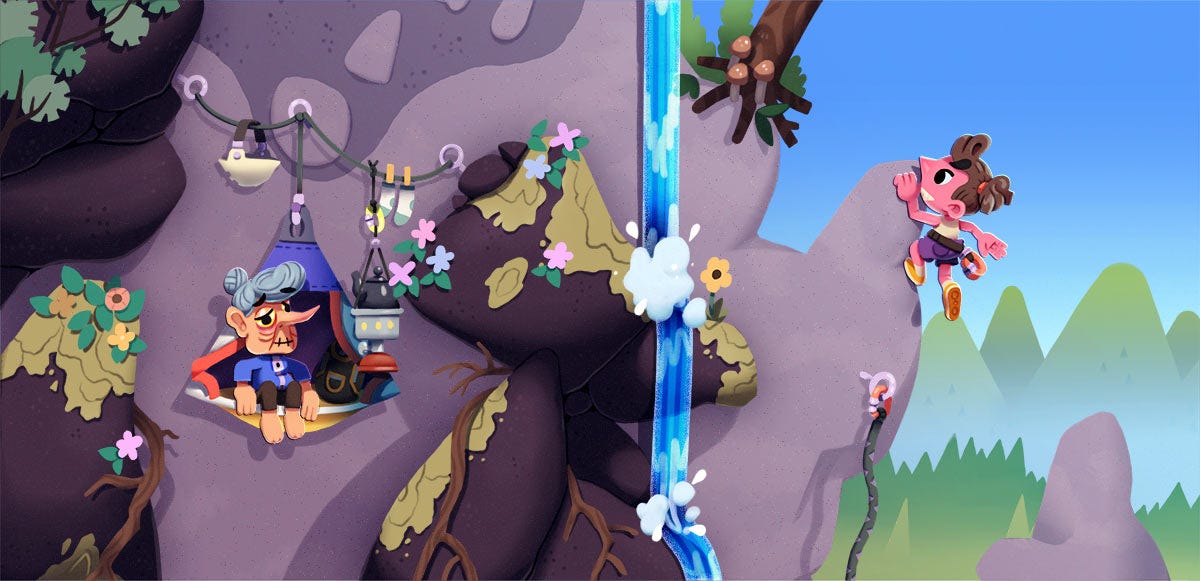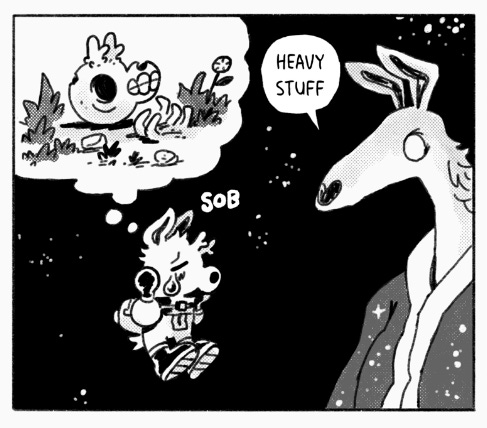Hallå pals!
Jonas here with another issue of Indie Notebook to get some ideas out of my noggin, and to inspire you to do the same.
I finished another sketchbook this weekend. I think I’ll try to make another sketchbook tour out of this one, like I did with the Banana Sketchbook. There are way more spoilers in this sketchbook than the next one though, it’s full of notes and ideas for future projects that might happen.
I’ll probably not start scanning the pages this or next week. I’ve got a bit too much to deal with right now and it does take a few hours to do all that.
At the moment I’m searching and applying for freelance jobs, so I spent last evening updating my portfolio. I’ve added a bunch of new stuff from Surmount, concept art, 3D stuff, WIP pictures, stuff like that.
You can see all of them over here if you’re curious. Just minor spoiler warnings, if you wanna go into it as blind as possible.
I’ve been unable to think or look at the project for a while. It’s hard to not get fed up with something after looking at it every day for more than 3 years. But now I’m actually in the mood to play it again. I miss swinging around and honestly the sense of adventure we managed to cram into it is something I struggle to find in other games. Just me and my backpack full of fun tools. Feeling proud today!
Reader Question: How to make a game fun?
An Indie Notebook reader reached out me earlier this week with a game development question. I thought it might be interesting for others too cause it was a great question. So I asked for their permission to publish our conversation here with some minor edits here. They kindly said yes, as long as I call them “H.”
H: Hey Jonas! Since you have a lot of experience being an indie dev and getting ideas out quick, I wanted to ask for some quick advice if you have a minute. I'm acting as a producer to a small group of people making a small game. A situation came up in which the game designers started to think of new features for the game before the base prototype was even fully done, because the first few playtests told us the game was boring. But since the base prototype isn't even fully implemented I don't believe it's boring because it lacks features but because the core features are not mature enough. But when I told them that, the designers said they don't know how to make the core mechanic more fun. And that's my actual question for you - how do I deal with a game designer that doesn't know how to make a game fun with what he's given? Is it just lack of experience? Are there brainstorming techniques I could offer them? Any books, videos?
Jonas: Hi “H”! This is a really fun question..! If you are making a type of game that already exists, it's quite easy to figure out, just look at everything they are doing and figure out what is missing in your game. I agree that adding more features most likely won't fix the core issue. I've tried that with several projects and I've even changed the core mechanic, and by the end I usually loop back to what I had in the beginning and do some small adjustment or accept a compromise that I tried to avoid. When this happens for me very early in a project I just scrap the prototype/idea completely unless there's something very very unique and promising there. So I would start by asking the question: is it a problem of skill or actually a bad idea? Lots of ideas sound good in theory but are impossible to pull off for one reason or another. There are certain problems that are fun and interesting to solve, other ones are just a pain. And it depends on who you are as well. Maybe it just doesn't click with them.
H: I see! In our case it's a game similar to an endless runner, and people said the obstacles themselves were boring right now, but I assumed that the "game design" part of that is tweaking them, instead of relying on like power ups and extra abilities to make it more interesting. I just worry because the game designers have some experience making small games, but little theoretical study, and I wondered how much theory/concepts matter in game design or if it's all just experience
Jonas: With endless runners you have a bunch of references to study. My guess is that you only need to have a few nice moves, and a good, varied rhythm of obstacles for it to feel fun. If the simple act of dodging isn’t fun, it’s probably because of a lack of rhythm? I think adding more obstacles is a good idea as long as they have an effect on the rhythm. Same goes with power ups and abilities I guess, as long as they change that rhythm in an interesting way. Maybe trying some different power ups and abilities could lead them to discover the unique hook of the game? If they’re just slapping on random power ups without consideration, it for sure won’t fix it (unless by luck).
But yeah, the basics should be fun even without slapping on all that stuff.
H: How would you say you learned game design?
Jonas: I think what helps me the most when thinking of any game design nowadays is the Thought/Time Loop by Rami Ismail. And here’s another relevant read much closer to the subject of endless runners that might help you.
H: Thank you so much, I'll pass the articles on! Thanks for the advice Jonas, I panicked a bit when they said they didn't know what to do haha but I'll nudge them with what you said.
Thank you to “H” for letting me publish this conversation!
Mini Notes
🔴 Youtube video - Every game designer should understand Orthogonal Design
This is something I had subconsciously realized but not found the words for when designing my own games.
You’ll get more depth in your game by avoiding doing variety by tweaking numbers, and instead focusing on having a variety of features that compliment each other in interesting ways.
✉️ Newsletter post - Your art and who cares about it
A great post by Kyle T Webster about how messed up it is, the way we perceive validation on our art.
Panel of the week
(from Space Deer)
Thank you for reading Indie Notebook! I’d love to hear what today’s issue made you think about.
Take care and have a creative week.








> Every game designer should understand Orthogonal Design
Been avoiding this video; i'm seeing it everywhere and I think if every game designer thinks the same way, we don't get very interesting games! The title makes me think I'm already doing this though, but I don't want to re-inforce my viewpoint with the video-makers perspective. ;)
It's cool you like your stuff; one time I made a program that takes random screen recordings from my computer and makes a 10 minute compilation video with 30 second clips, and it was fun to see various things I did (playing games, map making, programming).
Interesting article about art; "Friends, family, spouses, partners — they genuinely want you to succeed for no reason other than to see you happy and fulfilled." And what if I don't *need* to succeed to be happy and fulfilled? In this paradigm, this is my artistic weakness; it's very easy for me to please myself and be happy with my life. Just 10 minute compilations of old clips was enough to make me happy! Relevant: https://soranews24.com/2019/07/10/hayao-miyazaki-talks-on-how-working-hard-isnt-something-to-be-proud-of-not-forgiving-yourself/
I don't know how many paradigms there are available that I can choose that will lead to creative success. There's not only one. There could be 0, but that's unlikely; more likely I'd just not pick one of them by mistake. Right now, rather than stagnating on this idea for long I just get to work, though. :)
I'm glad you can look back on Surmount with fresh eyes again. It makes complete sense that you'd almost grow sick of it after years of staring at it though.
Your advice to H (not me, I swear) seems very reasonable. Game development seems so complex with all that interaction and player freedom. Whatever road leads you to a core experience that works is the one to take, it seems.